- Home
- Lloyd Alexander
The Gawgon and the Boy
The Gawgon and the Boy Read online
EDITOR / CONVERTER NOTES
Thanks to Boston Public Library for the high quality PDF Scans of the original book. I converted it using Adobe Acrobat DC Pro to plain text file and edited it using Gutcheck and Notepad++ to remove most errors from the file then created the ePUB using Sigil. As all ways this is not 100% perfect without a proper proof read so there will be the odd mistake. Enjoy the book and remember support the author if you like it.
- EyesOnly
I The Sea-Fox
When I first met The Gawgon, I never suspected who she was: climber of icy mountains, rescuer of King Tut's treasure, challenger of master criminals, and a dozen other things. But that came later, after I died-nearly died, anyhow. "They really thought you were a goner," my sister said cheerfully. She had come to stand at my bedroom door. "What a nuisance you are." In April of that year-one of those sour-tempered Philadelphia Aprils-I had the good luck to fall sick. I was delighted. Not that I enjoyed the worst part of it, but the best part was: It kept me out of school. Aside from a beehive buzzing in my head and a herd of weasels romping through my insides, I was beginning to feel pretty chipper. No one told me straight out what ailed me. I was eleven and had not reached complete visibility. My relatives, talking among themselves, tended to look through me-the Amazing Invisible Boy-or change the subject. I did overhear my mother and my aunt Rosie whispering in the hall about something Aunt Rosie called the New Mania. "Thank heaven it wasn't the Spanish Influenza," she said to my mother. "Spaniards! What else will they send us?" Aunt Rosie lived in a state of eternal indignation and distrusted anything foreign.
"That's right, you nearly croaked," my sister happily went on. "Uncle Eustace was ready to sell us a tombstone."
Uncle Eustace, my father's brother, indeed sold tombstones for a living. As a result of sinus operations, deep scars crisscrossed his face. It made him look grim and somber, an advantage in his line of work.
"If I croaked."-! made frog noises "it wouldn't bother me. I'd come back as a duppy and haunt you."
Duppy was the West Indian word for "ghost." I learned it from my father, born in Kingston, Jamaica. The prospect of meeting a duppy scared the wits out of him. Otherwise, he was completely fearless.
"There aren't any duppies in Philadelphia," my sister said. "So shut up about them. Just be glad you weren't quarantined."
I was not glad. I was disappointed. I would have liked one of those red or yellow stickers plastered on the front door, a badge of distinction. We still lived in the house on Lorimer Street then, and I had seen a few go up in the neighborhood, usually for measles, chicken pox, diphtheria (the Dip Theory, Aunt Rosie called it). Every so often a boy suddenly vanished as if the goblins had got him. The black-lettered warning would appear, then a few days later, the boy himself, grinning behind the windowpane, his face magnificently blotched-almost as good as being tattooed. What was done with girls, I had no idea. They were a tribe apart.
I knew my sister was frantic over the possibility of a quarantine. No one could have gone in or out except the adults and our family physician, Dr. McKelvie. She would have been confined to quarters along with me. She was seventeen, and it would have devastated her Tulip Garden.
The Tulip Garden was the name I gave her circle of girlfriends, all looking much alike with their bobbed hairdos of chestnut, auburn, blond on slender necks. Their meetings were forbidden to me. I could only lurk in the hall while, behind her bedroom door, the Tulip Garden whispered and giggled. Separated, they would have withered; or their hair might have fallen out in despair. When no quarantine was needed, my sister grew more kindly disposed toward me.
"You're going to be all right, blighter," she said. She held her nose and stepped away from the door. "Pee-you. What do you do in here?"
She hurried to her room as if legions of my germs might attack her. As for what I did: Apart from reading everything I could lay hands on, my favorite occupation was making up stories and drawing pictures to go with them. Before coming down sick, I had taken a fancy to piracy, gorging myself on Treasure Island, Captain Blood, and The Sea-Hawk. Now sitting up again, I went back to the high seas.
My mind began drifting. The Spanish Influenza got mixed up with the Spanish Main, with quarantines, duppies, Uncle Eustace, and my grandmother's green parrot, Nora. The best pirates had beautiful ladies to worship from afar. I did not. I had only begun to suspect that girls were interesting beings. But I remembered my Jamaican cousin Allegra-we had, the year before, taken a trip to Kingston. Golden-skinned, with a peach and turpentine fragrance of mangoes, she would, I thought, be just fine.
The Sea-Fox stood at the railing of the quarterdeck, his trusty parrot, Nora, on his shoulder, a spyglass to his eye. Who would have guessed this slim, steel-sinewed youth, captain of the most dreaded pirate ship to sail the Spanish Main, was the son of Lord Aldine, England's grandest nobleman?
A curious fate had set him on this course. Stricken by a terrible case of the New Mania, he had been sent on a sea voyage to regain his health. "No member of this family has had a sick day since the Norman Conquest," declared his father. "Off you go, you puny blighter. Never set foot in this manor again till you're fit to wrestle a bear."
Months later, sailing homeward strong and vigorous, he was sorry to end the happy life he had found on the open sea. But then, nearly in sight of England's bleak and rainy shore, pirates attacked "Avast! Belay!"-boarded his vessel, and swarmed over the deck.
Now lithe and muscular as a tiger, and handsomely suntanned, the lad fought so ferociously, to the wonder and admiration of friend and foe alike, that he was unanimously acclaimed "Hip-hip hooray!"-captain of the buccaneers. All hands turned pirate, eager to serve under his command. From that day, he and his loyal crew became the terror of the sea lanes; his good ship Allegra could overtake any sluggish merchantman. "Surrender, you lubbers! Join us or walk the plank."
Lord Aldine assumed the boy had either died at sea-proving a flaw in his son's character; or the ship had sunk-proving incompetence on the part of the ship master. Had the noble lord the slightest inkling of his son's profession, he would have exploded with purple rage.
The Sea-Fox narrowed his gaze on Kingston harbor: the green hills under a cloudless blue sky; the coconut palms and mango trees swaying in the warm breeze; taverns and storehouses clustering at the waterfront; the governor's gleaming white mansion rising above the town.
He smiled with satisfaction and called for the bosun, a grizzled old sea dog, brow and cheekbones crisscrossed by cutlass scars and a bad sinus condition.
"Mr. Eustace," ordered the Sea-Fox, "strike the Jolly Roger."
"Haul down the skull and bones? Aarr, Cap'n, what's afoot?"
"Then run up the yellow flag. Quarantine. Pestilence aboard."
"But, Captain," the puzzled bosun frowned "there's not even a case of measles. Except for Dr. McKelvie, the ship's surgeon, seasick as usual, we're hale and hearty, all the rest."
"Exactly."
When the Sea-Fox explained his plan, Mr. Eustace grinned and tugged a forelock: "Aye, a sweet little scheme. Aarr, Cap'n, they don't call ye Sea-Fox for nowt. And so we take the town, is it?"
"Kingston?" The Sea-Fox laughed. "Mr. Eustace, we shall take the whole island."
The bosun's face lit up. "Aarr, then we loot, sack, rifle, pillage."
"Whatever amuses you. Seize the jewels, gold, ginger ale, and all the mangoes. Spare only the governor's mansion."
The Sea-Fox again turned his spyglass landward to focus on the upper floor of the building where Allegra, the governor's golden-skinned niece, had stepped onto the balcony.
"As for plunder, Mr. Eustace, divide it equally among the crew. But," the Sea-Fox murmured, "one priceless gem is."
&nb
sp; 2 The Cupped Boy
Next morning, I felt a lot less chipper. My eyelids seemed to be glued shut; I spent some time and effort getting them open. I had thrashed around during the night, the bedclothes were in a tangled mess on the floor; even without them I sweltered. My mother, meantime, must have called Dr. McKelvie; for here he was, big, cheerful, and smelling like Listerine. "Well, now, laddie-buck, let's have a look at you." Dr. McKelvie dressed always in a black suit; a broad expanse of vest supported a gold watch and chain. His beard wreathed the bottom half of his face; it made me think of a bird's nest and I would not have been too surprised to see a cuckoo, like the one in my grandmother's clock, pop out of it. While my mother hovered, Dr. McKelvie went about his ritual of sticking a thermometer under my tongue, thumping my chest, listening through his stethoscope as if he were getting radio messages.
After that, there was talk about something to do with a hospital.
"Certainly not," my mother said. "Put him in with a crowd of sick people? To catch who knows what else?"
"Dear lady, in my considered opinion."
"In my considered opinion," my mother said, "I know how to look after my own child."
Most people would have been overawed by Dr. McKelvie, for he took up a lot of space. My mother was overawed by no one. She went on in a pleasant tone but one not to be contradicted.
"Out of the question. A hospital will do more harm than good. No, he is in the best of hands." Under her breath, she added, "Mine."
My mother, alarmed, must have telephoned my father, for he came home much earlier than usual. He had no difficulty getting time off, since he ran his own business in center city: a store that sold Oriental goods. He took me there on the occasional Saturday and I loved it: a treasure house smelling of moss sticks and incense, crowded with paper lanterns, screens, lamps, vases, and jewelry. He once had been a stockbroker. Why he quit and chose this exotic profession, I never knew; unless it simply amused him.
He came to bend over me. He wore elegant prince-nez glasses which I expected to fall off at any moment, but they always stayed clamped to the bridge of his nose. "How are you, Bax old sport?"
"Bax." was his latest nickname for me. I had no idea where or why he came up with it. Names in our family were flexible. While my sister Elise and I addressed our parents as "Mother." and "Father," other titles came up on the spur of the moment and stuck until new ones replaced them. Some stayed permanent. Though my mother always called my father by his proper name, Alan, he called her "Ed." or "Eddie." He still called his brother Eustace by his Jamaican boyhood nickname, "Mackerel Fat." and was, in turn, addressed as "Dog Flea."
Of names, I enjoyed more than my share. To Dr. McKelvie, I was "laddie-buck." To my sister, "blighter." To my various relatives, I was at one time or another "Skeezix."
"Skinamalink," or "Snicklefritz." Only my mother called me by my given name, David. To his question, I insisted I was fine.
"Of course you are," my father said.
My mother motioned with her head, and they went out into the hall. For the next couple of days, I was too foggy to be interested in much of anything. But I did perk up enough to try drawing pictures, imitating the cartoon panels I saw in the comic strips, and went back to Kingston, where I had left the Sea-Fox.
THE SEA-FOX CLAIMS HIS PRIZE
Miss Eustace, as ordered, had run up the yellow flag to signal pestilence aboard. The Allegra drifted closer to the harbor. Consternation reigned along the waterfront. The townsfolk crowded the wharves, shaking their fists and warning the plague-ridden vessel to stand away. A boat was launched and rowed within a safe distance from the ship. The harbor master, standing in the bow, commanded the Allegra to turn about and sail as far as possible out to sea.
"Aarr, it can't be done," Mr. Eustace called through a speaking trumpet. "It dammed well better be," flung back the harbor master, "else we open fire on you." The Allegra's crew, meantime, had hidden themselves well out of sight. Mr. Eustace repeated, "Can't be done, no matter."
Silently watchful on the quarterdeck, the Sea-Fox-who never told a lie-had assigned the bosun-who never told the truth-this deceptive but necessary task:
"No hands to work the ship," declared Mr. Eustace. "They're dead, all but me and the cap'n. Died of the Spanish Influenza; bloated bellies, running sores, that kind of thing."
"Dead! Awk, awk!" Nora bounced up and down on the shoulder of the Sea-Fox. "Every man jack, dead as doorknobs."
"No business of mine." The harbor master held a handkerchief to his nose. "Don't come near. Can't work the ship? Then drift out to sea on the night tide. Drift to the devil, for all I care."
"Aye, aye," replied the bosun, "so we'll do."
At midnight, following his plan, the Sea-Fox ordered the jolly boats lowered over the side. The Allegra carried a number of these small, light craft for just such occasions. With muffed oars, the Sea-Fox leading, the jolly boats skimmed swiftly to the sleeping harbor.
The crew, also according to plan, had draped themselves in lengths of sailcloth. Reaching the docks, they clambered ashore and gave voice to bloodcurdling shrieks. The drowsy watchman, rousing, gaped in terror.
"Duppies!" he bawled. "Hundreds! Duppies everywhere!"
Seeing the white-shrouded figures, convinced the town had been invaded by the ghosts of diseased sailors, the entire population raced for the hills. Adding to the panic, the crew smashed many huge barrels of ginger ale, and the amber liquid gushed in rivers down the streets. Warehouses were broken into, thousands of mangoes rolled in all directions.
The Sea-Fox, discarding his ghostly disguise, strode to the governor's mansion. Unchallenged, he climbed the marble staircase and halted at a bedchamber door. With one mighty kick from his booted foot, he shattered it from its hinges.
Allegra turned toward him. Months before, the Sea-Fox had boarded a vessel carrying her, the governor, and his lady to Jamaica. Ordinarily, the Sea-Fox would have set the passengers adrift. However, the sparkle in Allegra's eyes betokened more than passing interest and held a promise for the future.
"We shall meet again," he whispered in her shell-like ear.
Now here she was, her face aglow with the same illumination he had seen at their first encounter.
"You idiot," she said, "why did you kick down my door? It was unlatched; I was waiting for you. At least," she added, "you could have knocked."
The Sea-Fox nodded acceptance of this gentle reproof. He pointed at the town below, where his loyal crew were guzzling ginger ale and stuffing themselves with mangoes.
"Kingston is mine. And yours," he said. "I mean to declare Jamaican independence. The grateful population will acclaim us president and first lady. Or king and queen, if you prefer. We shall occupy this splendid residence."
"Have you lost your mind?" Allegra burst out. "Gone stark raving bonkers? Why do you suppose I waited for you? To stay on some boring island? Besides, I hate mangoes. I say we haul out of here, back to the high seas, plundering merchantmen, sinking frigates."
"Then so we shall!" happily exclaimed the Sea-Fox, who had not really looked forward to life ashore. "Yes, the two of us will terrify the Spanish Main together."
"My Sea-Fox!" cried Allegra.
"My pirate bride!" he answered.
"Your Sea-Vixen," said Allegra.
Later, my sister came to announce confidentially: "You're going to be cupped."
I had no idea what she meant. Put into a cup? It would have to be a large one.
"Grandmother phoned. She told Mother it would be a good idea. They did it to me once," she added. "It was disgusting and weird. Just the kind of thing you like. They're calling Mrs. Jossbegger."
This puzzled me. I knew Mrs. Jossbegger, a woman of some bulk who wheezed a lot. She had, so far as I could tell, nothing to do with cups. She made her living from feet: cutting ladies' toenails and paring their corns.
Mrs. Jossbegger made regular visits to Larchmont Street, where my grandmother kept a boardinghouse. On those occasio
ns, my mother and my various aunts gathered in the parlor. We all lived within a few blocks of each other, so it was an easy walk.
I was always glad to be taken along. At the boardinghouse, something was always going on: lodgers coming in and out, meals being cooked, a cluttered cellar I was allowed to explore. And, above all, Nora the parrot.
Nora had been left behind when one of the lodgers furtively departed still owing a good amount of back rent. Now she lived in the parlor, free to perch on her T-shaped pole or do acrobatics on top of her cage.
I never missed a chance to talk with her, though what she said was mainly gibberish, with a lot of squawking and whistling. Sometimes she did come out with understandable sentences:
"We're all drunk but Nora," she warbled, adding noises like breaking glass. Then she whooped and giggled. "Naughty boy, get your hand off my leg. Hoorah, hoorah!"
I could only guess at the life she had led before settling into the boardinghouse. The corn-cutting sessions were social events as much as they were podiatric treatments. Awaiting Mrs. Jossbegger, the ladies gathered in a circle, a grown-up Tulip Garden, drinking tea and gossiping.
Also attending was one of the two permanent residents: Aunt Annie (an honorary title, she was my grandmother's distant cousin), thin as a stick, always in floor-length black skirts, her white hair twisted into a bun. Although she hobbled downstairs for meals and other important happenings, she had never to my knowledge set foot outside the boardinghouse. The other permanent resident was Captain Jack-not a real captain, we called him that because it pleased him. Shell-shocked in the Great War, he never left his room at all; except, from time to time, when he went sleepwalking.
I admired Captain Jack as a great hero. His sleepwalking also fascinated me, and I wished I, too, could be a sleepwalker. I liked visiting with him and listening to his gramophone records. To him, I was "First Sergeant," and we were fond friends.
Aunt Annie, however, seemed a grim and forbidding presence. Not that she treated me with anything less than kindness. To her credit, at Christmas and my birthdays, when my relatives usually gave me handkerchiefs and underwear, she gave me books. Still, she made me uneasy. Invisibility has its advantages; but when she turned her sharp glances on me, watching me closely, I was no longer the Amazing Invisible Boy. On the contrary, I felt she could see me very clearly indeed and quite possibly could read my mind. For that reason, she frightened me a little. Or perhaps it was simply because she was very old.

 The Foundling and Other Tales of Prydain
The Foundling and Other Tales of Prydain The Castle of Llyr
The Castle of Llyr Taran Wanderer (The Chronicles of Prydain)
Taran Wanderer (The Chronicles of Prydain) Taran Wanderer
Taran Wanderer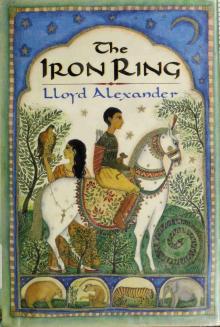 The Iron Ring
The Iron Ring The Arkadians
The Arkadians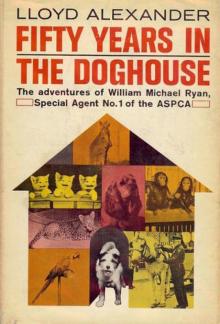 Fifty Years in the Doghouse
Fifty Years in the Doghouse The High King
The High King The Remarkable Journey of Prince Jen
The Remarkable Journey of Prince Jen The Book of Three
The Book of Three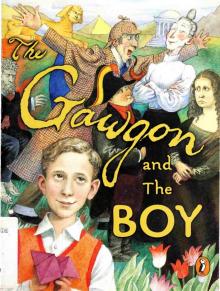 The Gawgon and the Boy
The Gawgon and the Boy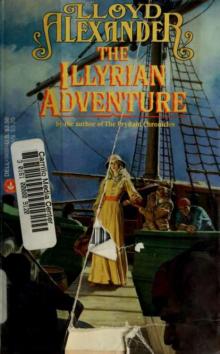 The Illyrian Adventure
The Illyrian Adventure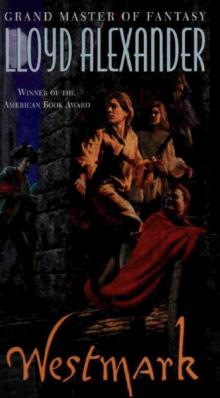 Westmark
Westmark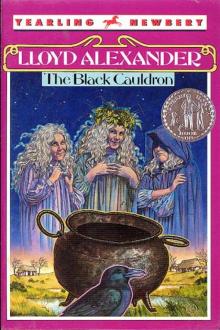 The Black Cauldron
The Black Cauldron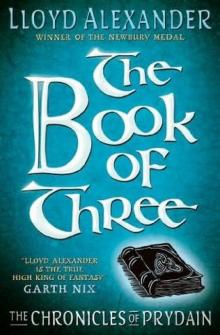 The Book of Three cop-1
The Book of Three cop-1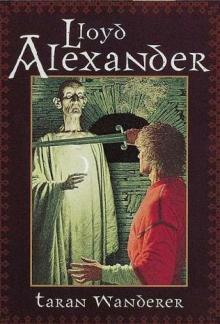 Taran Wanderer cop-4
Taran Wanderer cop-4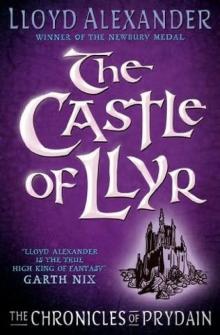 The Castle of Llyr cop-3
The Castle of Llyr cop-3 The High King (Chronicles of Prydain (Henry Holt and Company))
The High King (Chronicles of Prydain (Henry Holt and Company))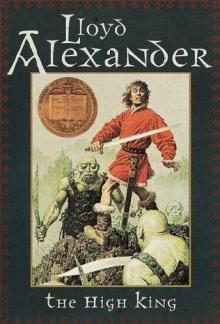 The High King cop-5
The High King cop-5 The Foundling
The Foundling The Castle of Llyr (The Chronicles of Prydain)
The Castle of Llyr (The Chronicles of Prydain)